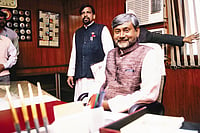The first non-Congress (or Congress clone) budget will be presented on June 1. This will also be the first budget of India as a nuclear state. Perhaps not a coincidencewhich is why the budget will be scruti-nised for its Vision, for its Signals about the future, and for its Policies (BJPS VSP). A budget without vision is as prone to crashes as a plane without a navigator. Signalling is important for a sense of the present and the future. Policies are the net outcomethe bottomline, and that which affect the lives, fortunes, and misfortunes of a billion Indians.
An Anti-Reform Budget? Anti-reform policies embrace protectionismgovernment should increase import taxes in the name of a "level playing field" or swadeshi economics; endorse babuismincrease the role of the government in deciding where markets and production should go (a MITI-type approach); espouse higher taxes to justify either removal of poverty or infrastructure development; embody jingoism by differentiating between domestic and foreign production; exemplify national pride by advocating "a strong currency"; and explain higher growth via the input of higher savings, rather than higher productivity of investment.
A significant majority of analysts believe that the budget would either be anti-reform or a limp continuation of the past. The reasoning: Pokhran popularity means that the BJP has no compulsion to be bold, and can afford to coast on a nuclear wave of support. I have a contrarian view: the nuclear reality is that the BJP does not have to cater to its extreme factions; it can ignore the tribulations of coalition politics; it can take the risk of being bold because it has nothing to lose and everything to gain.
So I expect the budget to be bold, not anti-reform. Look, therefore, for the following long-overdue policies to help India achieve its potential of an eight-plus per cent rate of GDP growth.
Rupee Devaluation: After the East Asian crisis, the loss in Indian industrys competitiveness is no longer in doubt. A competitive rupee is a rate close to Rs 48 to the dollar. Kickstarting growth without a devaluation would be a miracle and about as likely.
Decreased taxes: Theres a rumour floating around that the way to get an economy to grow is to raise taxes so that bad government expenditures are not cut and the fiscal deficit is cut to suit an accountants (or credit rating agencys) blind allegiance to an ideological identity. Look for import taxes to be cut along with a devaluation. Also the corporate tax rate should be trimmed to 30 per cent to match the maximum tax rate on salaries.
Large scale privatisation: The government has to be removed from its commanding heights position. It will be a case of entrepreneurs and the market seeing the world a lot more clearly once this Godzilla is removed from its pedestal. Privatisation should begin immediately, with a target of more than Rs 15,000 crore per annum.
Tax unification and corruption: There are at present eight customs duty slabs (excluding "special" slabs on goods like beer/wine, dried grapes etc), and 16 excise duty slabs. The rationale becomes clear once one realises that each extra duty slab is a licence for more corruption. The gradual trend towards unification and simplification of taxes should continue. Also expect political deductions (also known as tax incentives for savings) to be significantly decreased.
Infrastructure finance: Major inroads into this important arena are likely. Opening up of insurance to players regardless of sex, caste, creed or nationality is likely. Also expect tax holidays and tax benefits to accrue to investments in infrastructure.
A resurgence of growth is likely with a bold budget for a free India. A limp budget would confirm that Pokhran notwithstanding, India was doomed to remain a poor paper tiger, and one which would increasingly fail at the only meaningful battle with the world and Chinaeconomic growth.
The author is president, Oxus Research & Investments, the emerging markets research and asset management firm























